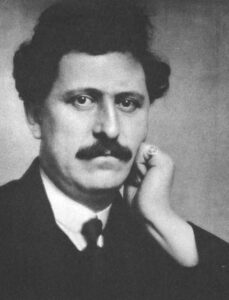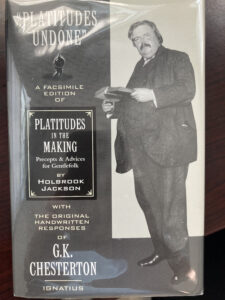
In 1911, Holbrook Jackson, a British journalist and socialist, privately published a little book called Platitudes in the Making, Precepts & Advices for Gentlefolk. G.K. Chesterton, a friend of Holbrook’s, received an autographed copy, and amused himself by handwriting witty responses to each of Holbrook’s nuggets of advice.
How do we know this? Because in 1955 Chesterton’s copy turned up in a San Francisco bookstore, discovered by a Chesterton enthusiast by the name of Dr. Alfred Kessler.
In 1997 Ignatius Press printed a facsimile copy of the book with Chesterton’s green-pencil notes included. It makes for highly entertaining and illuminating reading.
Sad to say, many of Holbrook’s socialistic statements actually have become platitudes. Sadder still to say, most of his statements are completely inane, which probably explains their appeal in modern culture. But Chesterton’s responses are as deadly as they are humorous.
Here’s what it all looks like. A few excerpts follow below.

Excerpts from Platitudes Undone
 H: As soon as an idea is accepted it is time to reject it. C: No: it is time to build another idea on it. Your are always rejecting: and you build nothing.
H: As soon as an idea is accepted it is time to reject it. C: No: it is time to build another idea on it. Your are always rejecting: and you build nothing.
H: Truth and falsehood in the abstract do not exist. C: Then nothing else does.
H: Things done on principle are things done wrong. C: Only on the wrong principle; this last principle, for instance.
H: When dealing with humanity remember you have to make the best of a bad job. C: See Fall, Doctrine of.
H: The theologian is the apologist of death. C: Why? Because he proclaims life everlasting?
H: All dogmas are right: but it is wrong to need them. C: All men need them, except the feeble-minded.
H: The gods are the progeny of the poets: the poets are the children of all. C: Ask the poets.
H: The god of theology: a power that creates to destroy. C: No: that is obviously the god of modern science.
H: Desire to please God is never disinterested. C: Well, I should hope not.
H: Those who preach salvation as a reward for virtue are spiritual hucksters — tradesmen of the soul. C: A fallacy. Virtue does not buy salvation: it produces it.
H: It is easy to be human; but humanism is a dismal failure: look at man. C: Look at him; but don’t look down at him. Verily I say unto you many prophets and professors have desired to be human beings and have not attained to it.
H: As soon as a nation becomes civilized it dies; yet man has but one idea — to become civilized. Thus he assists nature to correct her errors. C: No nation dies of mere civilization, It dies of progress.
H: Domestic animals are inferior animals. Domesticity is the last refuge of the inferior man. C: False. The domestic man is as much braver than the loose one as the domestic dog is braver than the fleeing rabbit.
H: Nowadays an eminent man who obeys the crowd is called leader. But there have been few real leaders even in history. Most so-called leaders have been tuft-hunters. C: If they were scalp-hunters it is all the same. The point is; why should they lead people where people don’t want to go?
H: Every custom was once an eccentricity; every idea was once an absurdity. C: No, no, no. Some ideas were always absurdities. This is one of them.
H: Only the rich preach content to the poor. C: When they are not preaching Socialism.
H: The poor can abolish poverty when they have had enough of it. C: And when they are ready to be shot.
H: The rich are not so happy as the poor, because they have not learnt the folly of owning things. C: IF most people not owning is Paradise, we are indeed in Paradise.
H: Nobody is competent in all things. Obedience is the prerogative of the incompetent. C: Yes. Let us all obey — but whom?
H: It is only natural you should obey your superiors; but they are not always above. C: But your real superiors often like you to choose for yourself.
H: Success is fortuitous — and useless. C: Success, like progress, means nothing by itself.
H: Class distinctions are necessary; but not those of to-day. C: Well, well. As long as we don’t have an Aristocracy of Intellect or Character, I shan’t mind much.
H: Socialism recognizes that there are limits to human trustworthiness, and, as a consequence, seeks to abolish private property. This is an admission that no men are fit to own things. C: Exactly. Socialism is Manichaean and castrates men to keep them pure. The Catholic Church permitted Love and Ownership, although they were certain to produce dangers and sins. Socialism reverses this courageous course and goes back to the desert with the pessimists.
H: The great revolution of the future will be Nature’s revolt against men. C: I hope Man will not hesitate to shoot.
H: He who reasons is lost. C: He who never reasons is not worth finding.
H: In a beautiful city an art gallery would be superfluous. In an ugly one it is a narcotic. C: In a real one it is an art gallery.
H: In a society worthy of the name all men would be artists — without knowing it. C: They all are; but without you knowing it.
